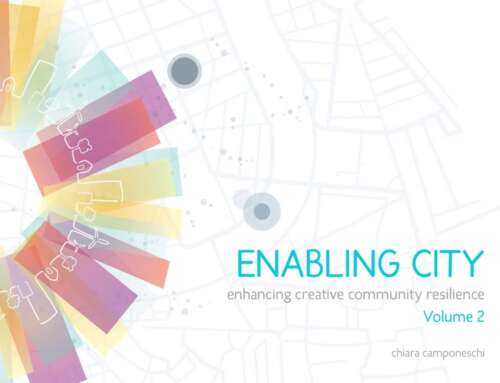 Here’s an idea: have a competition and exhibition to come up with ways to rebuild and revitalize the largely-abandoned strip malls in many suburbs. That’s what “Strip Appeal” in Alberta did.
Here’s an idea: have a competition and exhibition to come up with ways to rebuild and revitalize the largely-abandoned strip malls in many suburbs. That’s what “Strip Appeal” in Alberta did.
Here’s another: create an “unmonastery.” Instead of isolating the “monks” in one building, skilled and committed individuals would move into communities that can benefit from their involvement and collaborative help. That’s what’s happening in Matera, Italy.
And here’s one more: encourage working-class communities in a large city to compost their food waste rather than throwing it in the garbage by giving them food in exchange for each bag of compost they brought in. They’re doing it in New York City.
Those are just three of the ideas U of G student Chiara Camponeschi has gathered in her book, Enabling City (Volume 2), published in 2013. This book and the first volume reflect Camponeschi’s interest in helping cities and the people who live there become more resilient in the face of change. Both volumes are available in print and digital formats.
Camponeschi arrived in Canada from Italy at 17, ready to begin her undergraduate studies at York University. She studied political science and communications, and says they were excellent preparation for her later work. As an undergrad, Camponeschi started a couple of student clubs and worked for an international NGO with a focus on youth empowerment and sustainable development.
“For my honours thesis, I was looking at green consumerism and celebrity involvement in environmental causes, and what I learned in that research led me to want a model of engagement that was not based on consumption,” she says.
She went on to complete a master’s degree in environmental studies. “My interest in social innovation as a manifestation of active citizenship continued to grow. My thesis was on urban sustainability and participatory governance, and I did field research in places like Scandinavia and Toronto. Then I turned that thesis into a book – volume one of Enabling City.”
The book was downloaded in 60 countries within 30 days of its release and has been translated into three languages. Camponeschi also founded an organization called Enabling City that works toward promoting social innovation as a form of active citizenship. This work has led to speaking engagements and other opportunities around the world.
In 2012, Camponeschi enrolled in U of G to work on her PhD in geography and continue her exploration of cities and resilience. The second volume of her book has already been translated into four languages and has a video trailer.
“I think it is popular because it is timely – these are some very pressing issues,” she says. “Historically, cities have been quite resilient, but now the pace of change is escalating, and cities are larger than ever before.”
She believes that making cities more inclusive and just should be a priority. “That means things like having public transport rather than cars and eating local foods rather than imported,” says Camponeschi. “But we need changes in governance to really make some of the more innovative ideas possible.”
For her doctoral thesis, Camponeschi is working on a three-manuscript model for her dissertation; she will begin field work in January.
The first paper analyses 10 municipal climate adaptation plans to investigate how cities in Europe and North America are planning for resilience. The plans are examined within the broader framework of multilevel climate governance and the changing nature of municipal decision-making.
The second manuscript will be an analysis of two in-depth case studies of her field research in New York City and Copenhagen.
The third manuscript will assess the findings from the previous two works, centred on the development of a framework for knowledge mobilization and best practices. The expected outcome is a manual for practitioners and the public that highlights requirements and “red flags” for participatory urbanism and inclusive resilience.
Camponeschi has received some valuable assistance in her studies: in 2013 she was named a Trudeau scholar, bringing her four years of financial support plus mentorship and networking opportunities. “It’s phenomenal,” she says. “We have three annual events to attend with lots of opportunities to meet the other scholars, and the program really opens up doors for us.”
While much of her research takes her to larger cities, Camponeschi says she loves living in Guelph. “I came here not just because of the program but because of the quality of life,” she says. “Guelph is a livable city, very welcoming and progressive in terms of sustainability. The public discourse here has a different tenor than in many other places. There is a sense of caring that I value.”